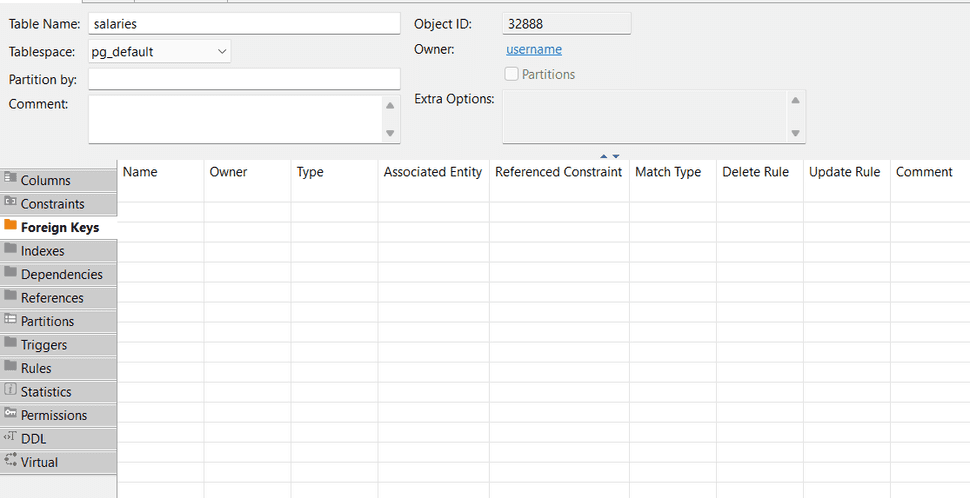
Working with Drop Column in Postgres
03.23.2022
Intro
The Add Drop statement allows us to remove columns from an existing table in SQL. This is a common statement to use as you are developing your app. In this article, we will learn how to use Drop Column in Postgresql.
The Syntax
The basic syntax of Drop Column is as follows:
ALTER TABLE [table_name]
DROP COLUMN
column_name data_type constraint;Getting Setup
We will be using docker in this article, but feel free to install your database locally instead. Once you have docker installed, create a new file called docker-compose.yml and add the following.
version: '3'
services:
db:
image: 'postgres:latest'
ports:
- 5432:5432
environment:
POSTGRES_USER: username
POSTGRES_PASSWORD: password
POSTGRES_DB: default_database
volumes:
- psqldata:/var/lib/postgresql
phpmyadmin:
image: phpmyadmin/phpmyadmin
links:
- db
environment:
PMA_HOST: db
PMA_PORT: 3306
PMA_ARBITRARY: 1
restart: always
ports:
- 8081:80
volumes:
psqldata:Next, run docker-compose up.
Now, navigate to http://localhost:8081/ to access phpMyAdmin. Then log in with the username username and pass password.
Click the SQL tab and you are ready to go.
Creating a DB
In this article, we will need some data to work with. If you don't understand these commands, don't worry, we will cover them in later articles.
We will be using the sample db provided here: https://dev.mysql.com/doc/sakila/en/. However, we will only enter what we need rather than import the whole db.
Next, let's create an employees table. This is a slightly simplified version of the sakila database.
CREATE TABLE employees (
emp_no INT NOT NULL,
birth_date DATE NOT NULL,
first_name VARCHAR(14) NOT NULL,
last_name VARCHAR(16) NOT NULL,
gender VARCHAR(1),
hire_date DATE NOT NULL,
PRIMARY KEY (emp_no)
);Now, let's enter a few rows
INSERT INTO employees VALUES (10001,'1953-09-02','Georgi','Facello','M','1986-06-26'),
(10002,'1964-06-02','Bezalel','Simmel','F','1985-11-21'),
(10003,'1959-12-03','Parto','Bamford','M','1986-08-28'),
(10004,'1954-05-01','Chirstian','Koblick','M','1986-12-01'),
(10005,'1955-01-21','Kyoichi','Maliniak','M','1989-09-12');An Example
Let's start with a simple example of dropping the birth_date column from our employee table
alter table employees drop birth_date;If we select the data, we no longer see the column.
|emp_no|first_name|last_name|gender|hire_date|
|------|----------|---------|------|---------|
|10006|Anneke|Preusig|F|1989-06-02|Dropping a Linked Column with Cascade
If we have a relationship column such as a foreign key, we will get an error and need to use the CASCADE clause.
Let's start by creating a salary table that references our employee table.
create table salaries (
id serial primary key,
salary decimal not null,
emp_no int not null,
foreign key (emp_no) references employees(emp_no)
);Now let's insert a row with a reference to an employee.
insert into salaries (salary, emp_no) values (10000, 10006);Now, if we try to drop the emp_no column from employees we will get the following error.
alter table employees drop column emp_no;QL Error [2BP01]: ERROR: cannot drop column emp_no of table employees because other objects depend on it
Detail: constraint salaries_emp_no_fkey on table salaries depends on column emp_no of table employees
Hint: Use DROP ... CASCADE to drop the dependent objects too.That is because our new salary table depends on the emp_no column. We can use CASCADE to get around this and the foreign key constraint in the salary table will also be dropped.
alter table employees drop column emp_no cascade;Here you can see the foreign key is gone.
